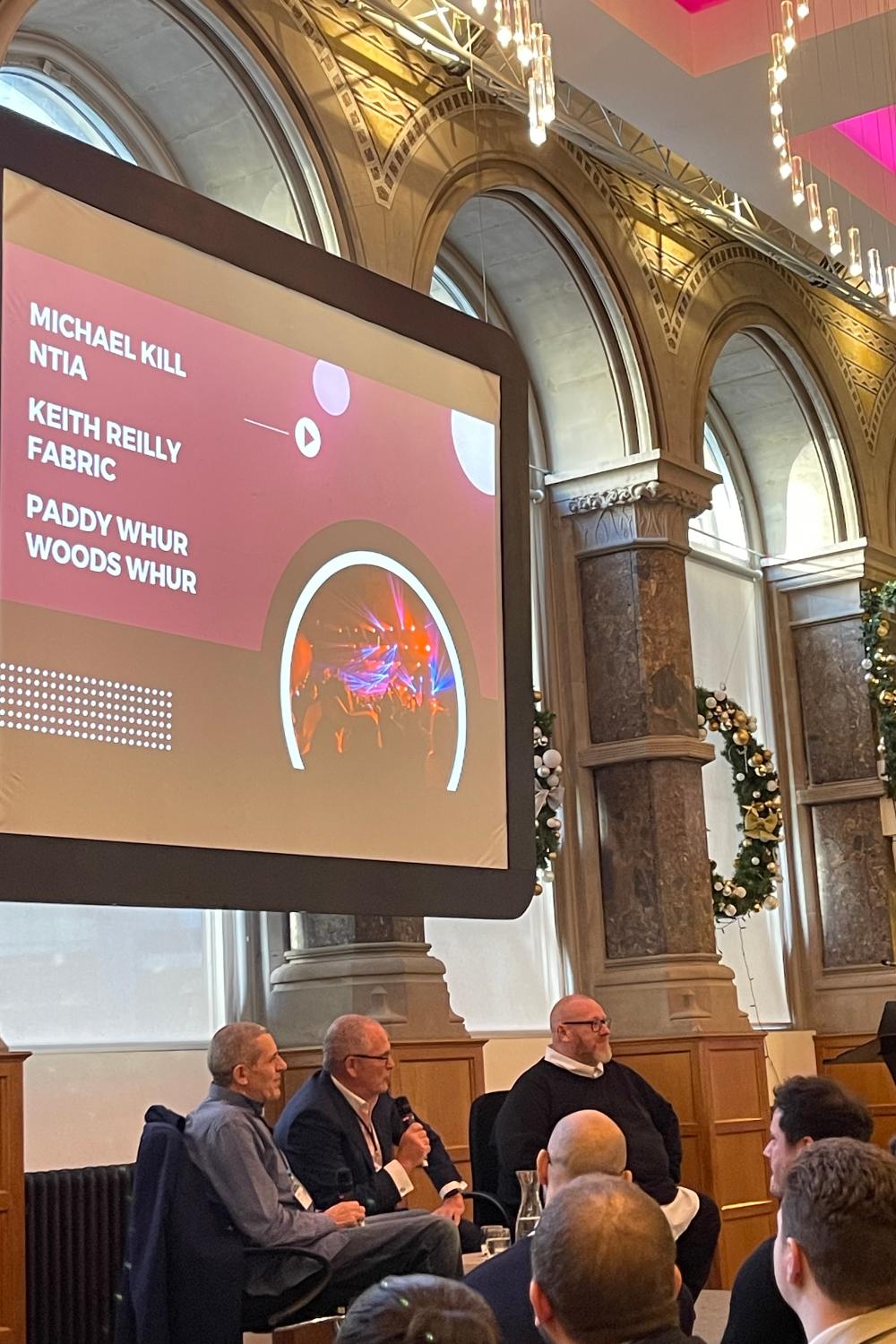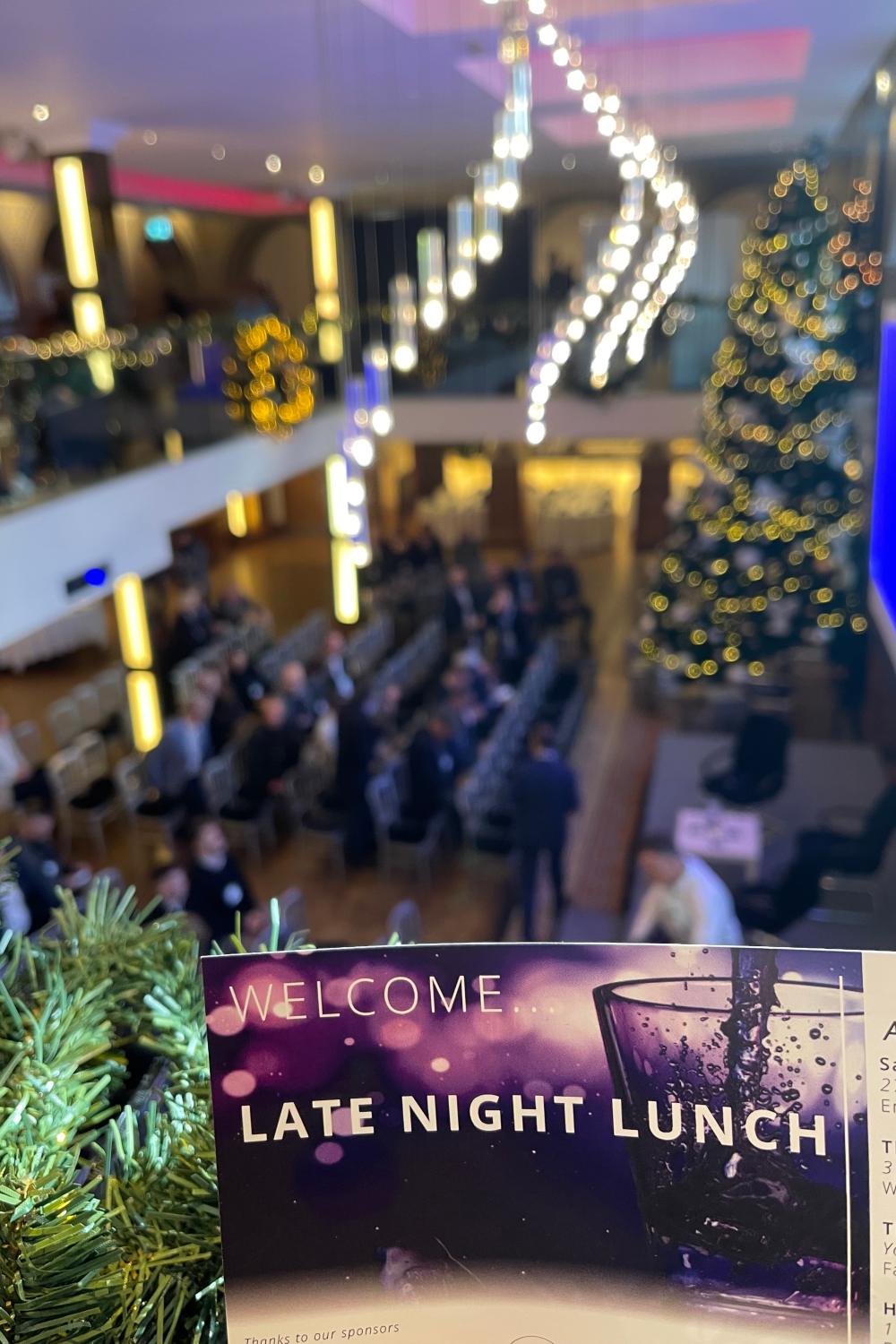NDML visited Late Night Lunch 2024
On November 26th, the nightlife sector’s brightest minds and trendsetters converged at Aspire in Leeds for Late Night Lunch 2024. This is a networking event of like-minded nightlife operators and industry leaders, involving talks and important questions.
From pubs and clubs, to competitive socialising venues, casinos and gaming lounges. Operators and distributors rubbed shoulders, discussing the challenges, opportunities, and future facing the modern late night sector.
If you would like to listen to this article, please find here an AI generated podcast version we are testing.
Be aware: There may be inaccuracies due to the technology’s limitations.
Government Engagement and Current Affairs

The first panel was hosted by industry leaders. Present were Paddy Whur of Woods Whur who tackles licensing law and litigations; Mike Kill, NTIA CEO; and Keith Reilly of Fabric nightclub in London.
Mike immediately listed off the main concerns facing the sector, as well as those most prevalent in the public eye. He listed Energy Inflation as the number one financial issue for members, and that he is conducting conversations with Ofgem. Energy and electricity bills are so costly that Mike believes nightclubs and nightlife businesses need to restructure their business plans to cater. A keen look at the financial business model of nightclubs and how the government can appropriately support them is long overdue.
Mike said we cannot forget about the threat of landlords evicting nightclub tenants, and the ever-rising trend of noise complaints. Motion, Boom and Heaven have all closed due to issues with landlords; nightclub owners will need to draw on their resilience, even if that means pivoting to survive. Mike’s also been talking to the UN about hearing conservation, as well as negotiating with trade organisations.

Much to the furor of the audience, Mike went on to discuss the recent Labour budget and the impact of NIC (National Insurance Contributions), which saw the lowering of the pay threshold required to pay NIC for employees from £9100 to £5000, and a rise in the national minimum wage from £11.44 an hour to £12.21 an hour. Minimum wage has seen an immediate £1.5 million cost to the sector, costs which will need to be addressed in the upcoming Spring Budget.
It appears Labour’s first 100 days have been riddled with policy changes, many of which the sector is trying to keep up with. One of these policies, which could have a huge impact, is the anticipated Spiking Bill.
This moves the conversation toward Keith Reilly and his recent experiences as the owner of Fabric. Fabric, ever since it’s closure and reopening, has seen a wave of support. Fabric, not so long ago, won in court against the Metropolitan Police, claiming their searches of queuing customers was illegal and that their search dogs are ineffective. Unfortunately, this ignited a police bias against the club, what’s informally known as Operation Lenore (a popular fabric softener). Fabric has since received £500,000 in public donations.

Closures is a huge issue in the sector, with the threats of landlords and noise complaints from residents – and now the optics of spiking in the media is also a risk to consider. Questions from the audience very much centered around spiking and how publicly announcing counter-measures could be an admittance of a problem which statistically doesn’t exist. It’s clear perception and reality are separate on this issue, but Mike reassured the room that the data is being tracked. He is adamant spiking is a societal issue and should be treated as such. 35% of spiking incidents take place in residencies, such as house parties.
Nevertheless, there remains a duty of care on the part of the nightclub, and hence risk-adverse measures such as drug testing, CCTV, appropriate staff training and first aid kits should be implemented.
A key legislative change that should soon be realised is for spiking to be a specific crime. Mike expressed that this change would help with collecting data and understanding the true extent of spiking. For example, of the 600 spiking cases taken forward in Scotland, not one person was charged or found guilty. The leaders present believed it’s a small group of vocal politicians pushing this issue for their own agenda, however they agreed a specific nominated crime would be beneficial.
There were also concerns around new CBD infused drink sales and lines mains mixing. This complex issue is on the rise, and the leaders said it should not be dismissed. Nightclub and bar operators need to show that they are aware of current issues, and express they are doing everything they can.
Also discussed was the deadline for the proposed training of 10,000 hospitality staff. Mike announced that the government has estimated this cost at £25 a head, and will be allocating it within the budget.

Operators Experiences and Trends
The second panel features operators with decades of experience. The speakers included Peter Marks of NEOS Hospitality, formerly Recon; Aaron Mellor of Tokyo Industries; Mark Shorting of Epic Bars and Clubs.
The discussion centred around the growth and future of nightclubs. Aaron of Tokyo Industries listed his 42 venues across the globe and mentioned his recent pivot to festivals. He said the last 20 months have been harder to navigate than the last 20 years.
The current market is tough and the budget has been unhelpful. Manchester and Newcastle remain hotspots for the industry, however London has proven difficult.
Mark of Epic Bars and Clubs agreed, saying post-COVID has been the business’s most difficult period. Mark has been running nightclubs for 47 years, and yet the lure of what he calls ‘proper nightclubs’ is seemingly depleting.
But there is some light to be seen. The minimum wage increase for 18-22 year olds should increase spend in clubs. This next generation coming through has been severely affected by lockdown, kids don’t know how to socialise – but it appears students are back out again. This has been the best student cohort since 2020. Midweek student nights are on the rise, yet hospitality venue still garner 80% of their income on Saturday night.
Fiscal changes have been significant. Peter Marks, who has decades of experience in the sector across various businesses, noted the wage percent spend in businesses is now at 35%, up from 20%. Peter told the operators inthe audience to be bold and put their prices up. Yet – he warned – to do this, you need to have products worth paying for.
They all agreed nightclubs should not be afraid of change. However maybe not dynamic pricing, which has recently seen criticism.
When ask to give their one piece of advice: Aaron said ‘Adapt to the marketplace, be flexible and keep evolving.’ Peter said ‘Consider property and remain flexible.’ Mark said ‘Get the front door right, and get the entertainment right. Do this and everything else will fall in place.’

Changes needed for nightclubs to survive
Nightclubs are disappearing, and many are having to change and diversify to survive. The NTIA notes that if the trend continues, the last club could shut by the end of 2029.
Some changes that the panel recommended which would help the survival of clubs is a VAT cut of 7.5%. Nightclubs owners feel they are not being heard in parliament, or prioritised. There are not enough decision-makers with an interest in nightlife. Music is the UK greatest export, and venues need to be supported.
Mark of Epic Bars and Clubs said operators need to focus their efforts on making their clubs the best it can be – focus on what we can change and affect.
Another issue is the difficulty to bring investors in to a nightlife business. Banks stopped investing in 2011. Adopting competitive socialising can be one way to attract investors. Comp-soc activities have taken off, and young people want to play games, look at all the successful examples on the high street. The next trend could be AI integration, but let’s wait and see.
Learn More About NDML

Nightclub Insurance
Get in touch to arrange a nightclub business insurance quote today
